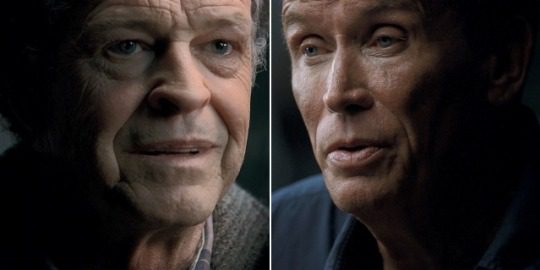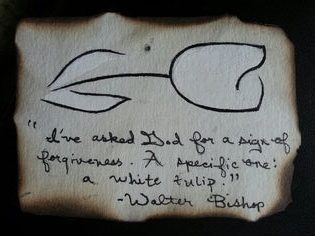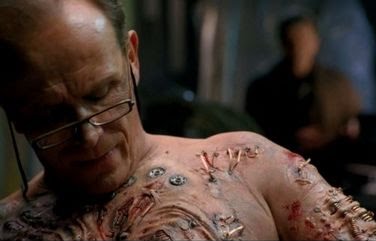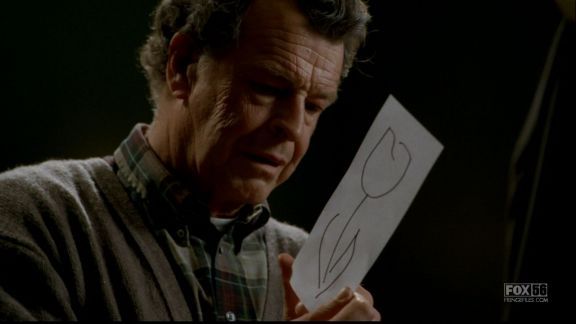When I was originally tasked to set about choosing an episode of a particular quality from a show I love, I naturally gravitated to a show I love more than most and that most have never even seen—that show would be J.J Abrams, Roberto Orci, and Alex Kurtzmann’s Fringe, the criminally underrated sci-fi show that ran on Fox for five seasons between 2008-2013.
The story follows Olivia Dunham (Anna Torv), Peter (Joshua Jackson) and Walter Bishop (John Noble) as members of the Fringe division, a fictional wing of the F.B.I, as they investigate cases of an unusual nature, but it morphs into so much more, I think the way Fringe evolves is actually very similar to another massively underrated show in the shape of Agents of S.H.I.E.L.D.
Both shows began their runs as nothing more than the usual monster of the week affair but both quickly develop and consistently look to expand and challenge themselves to reach new heights from both character development and a narrative point of view.
I initially found it hard to think of just one episode to pull from the immense collection of some of the most strikingly powerful and imaginative stories ever told on the small screen. So I set about trying to find an episode that encapsulates the show as a whole in a microcosm that exists within 42 minutes.
So I choose Episode 18 from Season 2 starring Peter Weller (Robocop) entitled “White Tulip,” co-written by J.H Wyman and Jeff Vlaming.It was directed by usual cinematographer/first time director Thomas Yatsko. This episode was the beginning of a big turning point for Fringe as it continued its evolution from a more episodic show to one that was more serialized in nature, shedding the fillers for expertly constructed thrillers.
The story of Alistair Peck’s (Peter Weller) blight is as seamless as it is poetic, the tale of the scientist trying to go back through time to save his fiancée, who was tragically killed in an automotive accident. If the subject matter of a brilliant man messing with the structure of the universe as we know it to save a loved one doesn’t give us a glimpse of what this masterpiece (Fringe) is as a whole then I don’t know what does.
The Fringe team answers the call to investigate an incident that occurred aboard a train that led to the deaths of several people that were seated in one of the passenger carriages. When they search for answers to the cause of the incident they are lead to the door of one Alistair Peck, a professor of astrophysics at MIT.
Upon discovering Peck’s home they soon find out that Professor Peck has built a homemade Faraday cage within his body to allow him to travel back through time, ostensibly transforming himself into a walking talking time machine. Using this apparatus Peck aims to eventually jump back 10 months into the past to save his fiancee’s life.
As noble as this endeavor sounds, it comes with horrific side effects due to the energy needed to power his D.I.Y time machine,. All life in the immediate radius is extinguished when Peck reaches his destination in time.
As the Fringe team closes in on him, at first nearly apprehending him in his apartment leading to Peck triggering his time machine to escape, after this we see multiple timelines play out as Peck continuously uses his device to evade capture. Which then, in turn, resets the timeline, each time bringing us back to the initial event on the train.
When we see these alternate timelines play out, what should be repetitive–seeing the same events transpire again–isn’t. Instead what occurs is another example of how clever the Fringe writing team was, changing little things in each timeline which ripple out and affect events on a more grand scale.
Trackback all those years ago when Walter Bishop was faced with the decision to choose between the few and the many—he weighed the options and risked it all by traveling to an alternate universe to save his son Peter’s doppelganger from certain death from a rare illness, which his Peter had already succumbed too.
Faced with the decision to not intervene and watch another Peter die or risk it all by trying to save him, Walter is resolute in his decision to not stand idly by and watch his son die all over again, committing to saving the alternate Peter which he is successful at doing, though the consequences for his actions are also grave in nature.
Walter’s mission to the other side forever damaged the very fabric of that universe, leaving it in a weakened and unstable state. For the sake of one, Walter jeopardized the lives of billions and the fate of their entire universe.
Now, just like Walter, Peck’s universe is no longer a vast complicated one. It consists of one single person, so to save the universe in his eyes all he has to do is save that one person, no matter the cost when it comes time to pay.
After the events have shifted somewhat throughout the timelines the team finally catches up to Peck but this time in his laboratory instead of his home, Walter convinces the other team members to allow him to approach Peck as a man of science. To see if he can speak to him on a level that might resonate with him, Walter does this in an attempt to avoid more death and bloodshed.
What follows next is three minutes of some of the best back and forth dialogue ever contained within any episode of any television program. The lines are delivered with maximum effect, each word hitting home like a sledgehammer, impacting the viewer with the full brunt of its emotional force. Just like in so many other episodes of Fringe, the dialogue is perfect and meticulously pieced together.
When Walter approaches Alistair, attempting to reason with him, to show him what the unforeseen effects are from his time jumps, and what the human cost is for his guilt, it is like Walter is talking to himself, trying to alleviate himself of all the guilt-filled emotional baggage that he lugs around with him everywhere.

It’s in this conversation where Walter tells Peck of what fuels him, what he has done and what the ramifications are from his actions. Peck then tells Walter that he has a plan to jump into a field to prevent any loss of life, instead only killing the surrounding plant life and vegetation.
Which leads to Walter bringing up the notion of God, Walter tells Peck about how he is seeking a sign of forgiveness from God for what he has done. That sign he seeks is a white tulip, feeling that if God can forgive him for what he has done so too might Peter.
It is then Alistair tells him that “Tulips don’t bloom this time of year, white or otherwise”, which is a clear sign that Peck is completely without the hope that Walter clings too so dearly.

Walter’s and Peck’s conversation in this instance gives us a glimpse of how both men’s characters are near mirror images of one another, broken by their past failings, weighed down by their grief and loss, every fiber of their beings just chock-full of their self inflicted agony, except for that one defining factor that Walter still has that hope—the very same hope that Alistair has been stripped of by the guilt of not been able to be there for his fiancé when she needed him the most.
During the episode we see Walter conflicted with the decision to give a letter to Peter that contains the agonizing truth about his origins. Though Walter fears the outcome from disclosing the truth to Peter, he hopes that he can find it in his heart to forgive him.
In attempting to dissuade Peck, Walter is trying to not only save Alistair but also himself, trying to find some semblance of the redemption that he has been seeking for so long. Walter feels that if he can save Alistair then maybe he too can be saved and that he is not totally void of humanity, which is something he fears more than anything.
Throughout the series we discover that Walter resorted to measures of an epic proportion to maintain his grip on that said humanity; he fights tooth and nail for it, never missing out on an opportunity to save a like-minded soul.
When Walter looks at Peck he sees the reflection of all of what his bad decisions could have brought him had he not been curtailed in the way he was. (An accident in his laboratory below Havard leading to the death of his assistant resulted in Walter been incarcerated in a mental facility for nearly two decades.)

One could say that the devices that Peck fills his body with to allow him to time jump could be used as a metaphor for how Walter views that other side of himself, just like a sufferer of dysmorphia Walter sees himself warped and not as he really is, what he sees is a man transformed into a grotesque monster by his hunger for scientific exploration.
Upon hearing what he has to say, Peck seems to ignore Walter, setting off his device to travel back through time and to reset the episode. It is now we see Peck at home writing a letter, then we see Peck getting in the car alongside his fiancé just in time to say “I love you” before they are both instantly killed by an oncoming truck.
When this episode culminates, it brings us some of the most beautifully shot and well-written scenes in the entire run of Fringe. We see two actors with decades of experience with their full arsenal of skills on display.
The climax is both tragic and poignant when we see Alistair’s fate. It was so incredibly beautiful, but also one of the most heartbreaking scenes I have ever witnessed in any show or movie. It was the perfect ending for Peck, even though he was a one and done character the way his demise is handled is another example of how much care the creators behind Fringe take with their characters and their arcs no matter how big or small.

In the last scene when Walter receives the white tulip (mailed to him by Peck but Walter believes it to be a message from God as he does not know Peck now due to the timeline being reset), at that moment we see what a world-class actor John Noble is, without saying a word we feel the full range of emotions that are flooding him, body and mind in that instant. Noble once again proves that Walter is the heart and soul of Fringe, his character embodies everything that makes Fringe what it is.
Walter is brilliant, filled with pain, regret and always on the run from his past transgressions, but even though he is weighed down by the considerable mass that is attached to him by all of these things, at this moment when he peers down through weary eyes upon that white tulip, he feels that hope again and I think that message of hope is exactly what Fringe is all about at its core.
“White Tulip“ is a perfect example of how the creators and the writing team that brought Fringe to our TV screens never shied away from complicated and extremely intricate stories, using them to weave the overall seasonal story arc together which in my opinion is what made Fringe evolve into one of the best sci-fi shows of any generation.


I so wish with all my heart. That Fringe return as a TV Series again.. and so believe Walter, was the soul of the show. Walter was my hero..
I am rewatching the series through again (for the 7th…8th time?), and this episode has always stuck with me. This was a beautiful recounting. 😭
I just purchased the series from Ebay! I will be re watching! One of my favorite shows!!!
Thank you.
Easily my favorite show ever…loved this episode too. I always wished they would pick the show up where they left off but from when Walter and the boy landed in history.
I was a huge FRINGE fan as well. Awesome show 💜💜
Thanks for giving us this masterpiece review on this masterpiece TV-show! In my opinion, Fringe is a timeless sci-fi show that will stay relevance for generations to come and deserves to be re broadcast in every 5 season.
I agree with everything you wrote. I’m glad that there are more people out there who know just how great that show was.
One of My All time Favorite Shows.. Period! Was so Bummed when it went off the air, but I ( Honest truth) watch an episode each night before bed!! Ask my wife! I so wish that Netflix or Hulu would pick it up and show the whole series and start anew with the Same Cast!! Miss it!!
I stop counting my binge watching Fringe after ninth time.
I think the show is my bible and Walter is my prophet.
The absolute best sci-fi show. I’m in love with it. This episode was beautiful and heartbreaking…the very last scene. If you have firestick, it’s streaming free on imdb tv
Just finished binge rewatching of the whole series of Fringe on 7 Flix (my 2nd viewing) – and I also have the whole series on DVD – not watched as yet. One of the best-ever TV series. And yes, I was a fan of X-Files, but Fringe was better. So satisfying. Characters, storyline, writing, plot and mythology development. And all the pieces coming together again in the 5th season – the observer child, September and the white tulip. Wonderful!